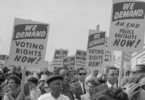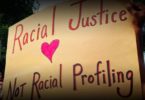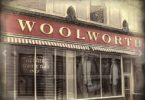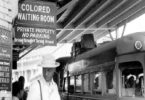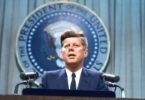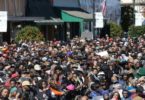| Event |
Date |
Description |
| Civil War |
1861-1865 |
The election of anti-slavery president Abraham Lincoln caused southern states to separate from the Union and form the Confederate States of America. |
| Reconstruction |
1866-1877 |
Process of rebuilding the South and efforts to assimilate African Americans to society. |
| Thirteenth Amendment |
1865 |
Abolished slavery |
| Civil Rights act of 1866 |
1866 |
All citizens have equal rights to enforce contracts, to sue, to give evidence, to purchase, sell or lease property. |
| Ku Klux Klan |
1867 |
Formed in Nashville, Tennessee to terrorize African Americans in the South. |
| Fourteenth Amendment |
1868 |
All persons born or naturalized in the U.S. were citizens. |
| Civil Rights Act of 1870 or First Ku Klux Klan Act |
1870 |
Enforced the 14th Amendment. Prohibited discrimination in voter registration based on race or color. It gave federal courts the power to enforce the act and employ federal marshals or the army. |
| Civil Rights Act of 1871 or Second Ku Klux Klan Act |
1871 |
Placed elections under federal control. |
| Third Ku Klux Klan Act |
1871 |
All citizens are guaranteed the rights afforded by the Constitution and provided legal protection under the law. |
| Civil Rights Act of 1875 |
1875 |
No citizen can be discriminated against in the use of public accommodations such as inns or restaurants based on race or color. |
| Civil Rights Act of 1875 declared unconstitutional |
1883 |
Individual businesses have the right to choose their clientele. |
| Sections of the Ku Klux Klan Act declared unconstitutional |
1883 |
The Supreme Court declared that amendments apply to states and not to individuals. |
| Plessy v. Ferguson |
1896 |
The “separate but equal” doctrine is held constitutional by the Supreme Court. |
| Founding of the National Association for the Advancement of Colored People (NAACP) |
1909 |
W.E.B Du Bois founds the NAACP to advocate equality and equal opportunities for African Americans.
|
| Founding of the Brotherhood of Sleeping Car Porters |
1925 |
Founded by Philip Randolph to seek better working conditions and compensation. |
| Sipeul v Board of Regents of the University of Oklahoma |
1948 |
No state can discriminate against a law student on the basis of race and the application of the 14th Amendment. |
| Brown v Board of Education of Topeka |
1954 |
The Supreme Court ruled that separate but equal educational facilities are “inherently unequal”. It overturns the Plessy v Ferguson case of 1896. |
| The Emmett Till Case |
1955 |
Emmett Till was an African American teenager who was brutally murdered. The accused were found not guilty of murder. He became an icon of the Civil Rights Movement. |
| Rosa Parks and the Montgomery Bus Boycott |
1955 |
Rosa Parks was arrested for refusing to give up her seat on a segregated bus. A group led by Martin Luther King Jr. started a campaign protesting segregation in the Montgomery public transportation system. It lasted 381 days. |
| Southern Manifesto |
1956 |
A group of congressmen from the south wrote the Southern Manifesto or Declaration of Constitutional principles against the Supreme Court Ruling of Brown v Board of Education of Topeka which ruled against school segregation laws. |
| Southern Christian Leadership Congress |
1957 |
The SCLC was founded by Martin Luther King Jr. |
| Civil rights Act of 1957 |
1957 |
Established a 6-member Commission on Civil Rights and a Civil Rights Division in the Department of Justice. |
| Youth March in Washington DC. |
1958 |
Lead by Martin Luther King Jr.10,000 people marched to show support for the end of segregation in public schools. |
| Sit-ins |
1960 |
Sit-ins in Greensboro, North Carolina organized by CORE and SCLC. Sit-ins led the Woolworth department store to desegregate its stores. |
| Boynton v. Virginia |
1960 |
The Supreme Court overturned a judgment convicting an African American of trespassing when being in a “whites only” restaurant at a bus terminal. It ruled that racial segregation in public transportation was illegal because it violated the Interstate Commerce Act. |
| Civil Rights Act of 1960 |
1960 |
It enforced the Civil Rights Act of 1957 by introducing penalties for obstructing the implementation of federal court orders. It also established federal inspection of voter registration polls. |
| Freedom Rides |
1960 |
African Americans and whites rode together in public transportation to challenge local laws. The first congregation was in Washington, DC. |
| James Meredith and the University of Mississippi |
1961 |
Meredith secured admission but was denied access. Federal Marshals had to escorted him to campus. Riots broke out. |
| The March on Washington for Jobs and Freedom |
1963 |
Over 250,000 gathered at the Lincoln Memorial to commemorate the 100th anniversary of the Emancipation Proclamation. Martin Luther King Jr. gave his historic speech “I Have a Dream” |
| Freedom Summer Project |
1964 |
Voter registration effort led by CORE and SNCC to expand voting in the South. |
| Civil Rights Act of 1964 |
1964 |
It outlaws discrimination in public facilities and in voting. It created the Equal Opportunity Commission to monitor employment discrimination in public and private sectors. Criminal penalties for violating the act. |
| Nobel Prize |
1964 |
Martin Luther King Jr. was awarded the Nobel Peace Prize for his labor as a leader in African American Civil Rights. |
| Selma and Bloody Sunday |
1965 |
Thousands were arrested when demanding the ballot. |
| Voting Rights Act of 1965 |
1965 |
Eliminated literacy test, poll taxes and authorized federal examiners to supervise voter registration. Criminal penalties for violating the Act. |
| Watts Riot |
1965 |
Riots in the Watts neighborhood in Los Angeles broke after police arrested an African American suspected of drunk driving. Allegations of police brutality spread and the community reacted violently. |
| Black Panther Party |
1966 |
The Black Panther Party is founded in Oakland, California by Huey Newton and Bobby Seale. The party betrays the non violent philosophy of King. |
| Assassination of Martin Luther King Jr. |
1968 |
James Earl Ray was arrested and convicted of King’s murder, he was convicted to 99 years in prison. It is estimated that 300,000 people accompanied his coffin. |
| Civil Rights Act of 1968 or Fair Housing Act |
1968 |
Prohibited discrimination in the sale of rental of housing. |
| Alexander v. Holmes County Board of Education |
1969 |
The Supreme Court ordered that the southern school districts must end segregation at once. |
| Civil Rights Act of 1991 |
1991 |
It overturned several Supreme Court decisions and makes it easier for employees to sue employers in cases of discrimination. |
| Riots in Los Angeles |
1992 |
Riots in Los Angeles lasted for three days after four white police officers were acquitted for using excessive force against Rodney G. King. Five people were killed and over 2,000 injured. |
| Barack Obama |
2009 |
Barack Obama was elected the 44th President of the United States. He is the first African American elected to the office of the presidency. |

